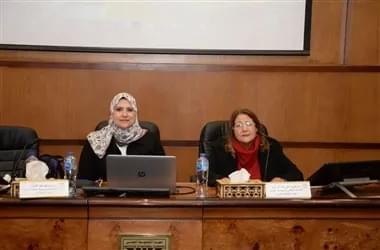The Institute of National Planning held the fourth scientific follow-up activity, during which the “Egypt Country Climate and Development Report” issued by the World Bank in November 2022 was reviewed, presented by Dr. Zainab Al-Sadi, a teacher at the Regional Development Center, and managed by Prof. Aziza Abdel Razek, coordinator of the activity and scientific supervisor of the scientific follow-up workshops, which stressed the importance of the report in presenting the challenges facing climate action in Egypt, and reviewing the government’s long- and short-term plans in facing those Challenges.
In this context, Dr. Zainab Al-Sadi explained that the report, which was launched within the activities of the COP 27 climate conference, provides an analytical study on the current state of development and the challenges facing Egypt as a result of climate change, while identifying the best procedures, policies and investment opportunities that can help in the development process during the next five years, while at the same time reducing the effects of climate change and preserving the sustainability of natural resources.
This comes as the report discussed the current status of the development process in light of successive crises and the effects of climate change on that process, and the factors that exacerbate the crisis, including the increase in the urban population and the escalation of climate risks.
In addition to the above, the report also reviewed the Climate Change Strategy 2050, a study of the roadmap towards resilience and low-carbon development, and the mechanism for providing the appropriate environment for the transition to low-carbon development and providing the required financing for different scenarios.
The report put forward a set of recommendations that will help Egypt achieve its development goals while highlighting a set of priority measures to address the current challenges, including enhancing efficiency in the use of resources and allocating them based on their real value, especially water resources, stressing the importance of providing accurate and updated information systems, and the need to pay attention to providing the appropriate environment for the transition to low-carbon development and providing the required financing for various scenarios for low-carbon development.
Download the report:

